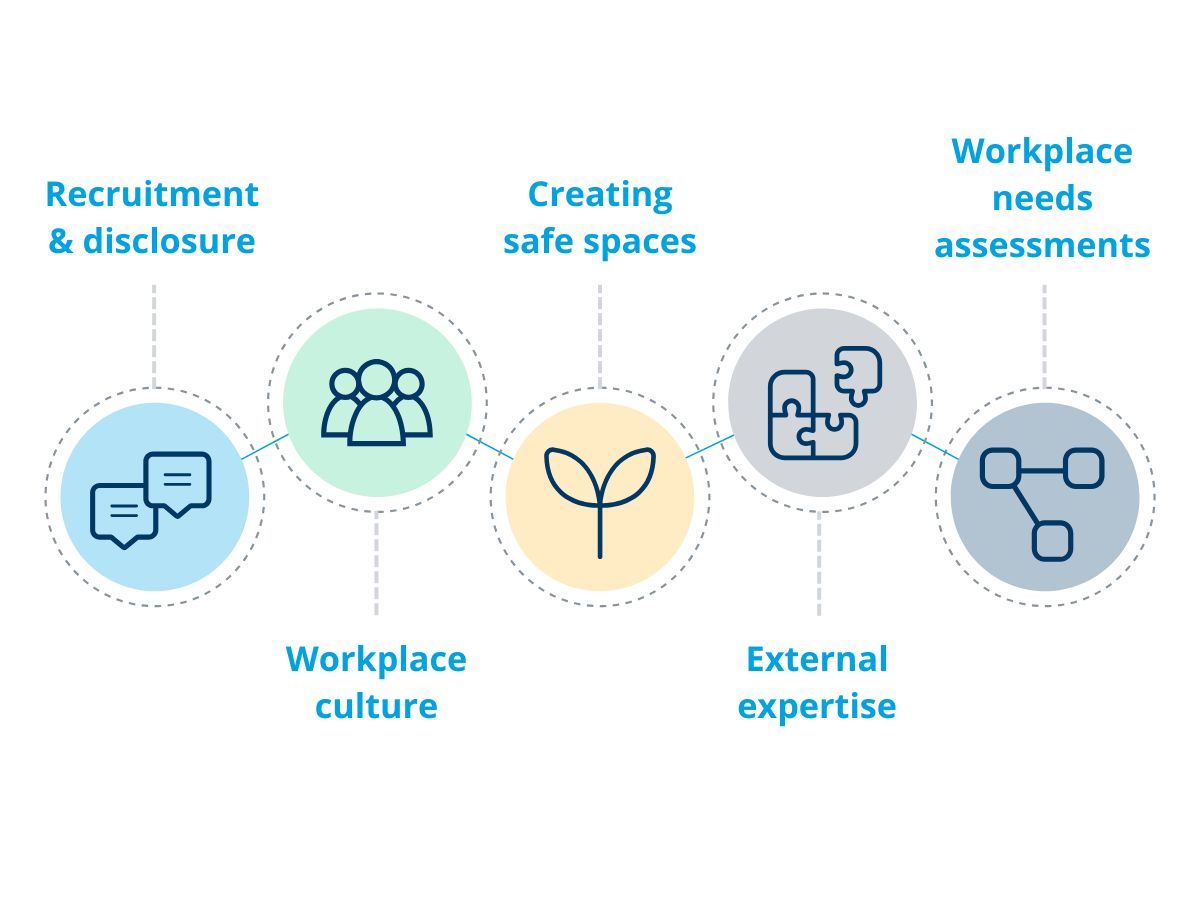Neurodiversity and mental health in the workplace are not new concepts, but they have gained attention in recent years. Many large corporations have embedded them within their Equity, Diversity and Inclusion (ED&I) strategies. However, are SMEs missing a key talent opportunity by not adopting similar approaches? Prioritising neurodiversity can give smaller businesses a competitive edge, fostering innovation, enhancing team dynamics, and boosting overall business performance.
Understanding ED&I
ED&I are principles that help organisations create fairer, more inclusive workplaces. Sometimes referred to as D&I, DEI&B (including belonging), or DEI&W (which includes wellbeing), this framework ensures employees feel safe, supported, and empowered.
According to Inclusion Hub:
“Diversity, Equity & Inclusion (DEI) encompasses the symbiotic relationship, philosophy, and culture of acknowledging, embracing, supporting, and accepting those of all racial, sexual, gender, religious, and socioeconomic backgrounds, among other differentiators.”
Although 1 in 4 people are neurodivergent, this aspect of ED&I is often overlooked. A truly inclusive workplace supports all employees rather than singling out particular groups. The general misconception is that these policies support the few rather than the majority. At Aim Forward, we believe ED&I should be integrated into company culture rather than treating it as a tick-box exercise.
Why neurodiversity inclusion strategies are important in business
Neurodivergent individuals possess unique skills that can benefit businesses. These skills can include:
- creative problem-solving
- analytical thinking
- attention to detail
- high levels of focus in specialised areas
As Gen Z and Generation Alpha step into leadership roles, organisations must adapt to their growing focus on mental health and inclusivity. Companies that embrace neurodiversity as an asset gain a competitive advantage by allowing individuals to reach their full potential in a supportive environment. This benefits all employees.
How can SMEs take action?
Smaller businesses are often time-poor and resource-constrained, leading them to focus on immediate needs rather than long-term culture shifts. However, embracing neurodiversity doesn’t have to be overwhelming. Here’s how SMEs can stay ahead of the curve:
1. Learning from larger corporations
Several large corporations have successfully embedded neurodiversity into their ED&I strategies. For example:
- PwC – runs affinity networks that focus on disability, gender, and ethnic diversity
- KPMG – offers inclusive leadership training and IDSE (Inclusion, Diversity & Social Equality) committees
- Deloitte – operates a ‘Neurodiversity at Work’ initiative
- Unilever – has a Disability Confidence Programme aimed at fostering accessibility and inclusion
The key takeaway? These companies don’t treat inclusion as an add-on—it’s embedded into their culture.

2. Rethinking the stigma around disability
Many corporate programs still categorise neurodivergence and mental health as a ‘disability.’ While technically correct, this can create barriers to discussions and disclosure due to outdated stigmas. Businesses should allow for discussions and disclosure of neurodivergence and mental health outside of disability initiatives. They should focus on celebrating the strengths that neurodivergent employees bring to the table.

3. Practical steps for SMEs to support neurodivergent employees
While large companies have dedicated teams for ED&I, SMEs can take straightforward steps to create an inclusive culture.

Recruitment & disclosure
- Ensure job descriptions use clear, inclusive language.
- Make it clear you welcome applications from diverse backgrounds and are prepared to offer reasonable adjustments. For example, “We welcome candidates from diverse backgrounds and can make various reasonable adjustments to consider individual needs.”
- Think about how to make your recruitment process inclusive. You could offer alternative application processes (e.g. video submissions). You could provide an overview of the interview structure, with examples of questions and tasks for them to prepare in advance? Be proactive and offer adjustments that allow candidates to bring their best selves to the recruitment process.
- Foster an open-door policy from day one.
Workplace culture
- Normalise conversations about neurodiversity and mental health. Daily conversations can make a huge difference.
- Secure senior leadership buy-in to drive change.
Implement simple policies that benefit both individuals and the team at different levels. Personal development reviews are a great opportunity to speak to employees about workplace adjustments that could support their role and increase productivity.
Creating safe spaces
- Designate quiet workspaces or offer flexible working environments
- Encourage open dialogue about workplace adjustments. Disclosure often happens informally through day-to-day conversations
- Offer mental health and neurodiversity awareness training for all employees
External expertise
- Partner with companies that actively support neurodivergent individuals
- Continually review and adapt practices to ensure ongoing inclusivity
- Invite specialists to conduct workshops
Workplace needs assessments
- Offer workplace needs assessments to individuals who have disclosed a neurodivergence or mental health condition.
- Aim Forward workplace needs assessments:
- Explore the impact of an employee’s neurodivergence, mental health condition, or disability in their role.
- Offer tailored solutions empower organisations to meet their legal obligations and implement effective adjustments, boosting productivity, performance and inclusivity
The competitive advantage of implementing neurodiversity inclusion strategies
Investing in neurodivergent employees isn’t just about social responsibility—it’s a smart business move. Companies that harness neurodivergent talent often see:
- Increased innovation due to diverse problem-solving approaches
- Improved team performance from complementary skill sets
- Enhanced employee retention and satisfaction
- A stronger employer brand makes it easier to attract top talent
By embedding neurodiversity into workplace culture, SMEs can position themselves as forward-thinking, inclusive, and ultimately more competitive in an evolving business landscape.
Neurodiversity is not a trend—it’s an opportunity. While large corporations are beginning to pave the way, SMEs have the agility to lead the charge in making workplaces more inclusive and effective. By taking small, intentional steps toward a more neurodiverse-friendly culture, SMEs can unlock untapped potential, boost business performance, and ensure long-term success
How Aim Forward can support you
At Aim Forward, we have helped individuals across industries to thrive in the workplace. We provide needs assessments, diagnostic assessments and coaching to help neurodivergent people succeed at work. Our experienced and friendly assessors work with your employees to uncover challenges and create strategies to overcome them.
Contact our dedicated team and find out how we can help support your neurodiversity inclusion strategies.
NOTES
- Just 31% of people with a neurodiversity condition are in employment compared to 54.7% of disabled people overall
- Reference 1 – https://www.inclusionhub.com/articles/what-is-dei#:~:text=Diversity%2C%20Equity%20%26%20Inclusion%20(DEI)%20encompasses%20the%20symbiotic%20relationship,socioeconomic%20backgrounds%2C%20among%20other%20differentiators.


Recent Comments